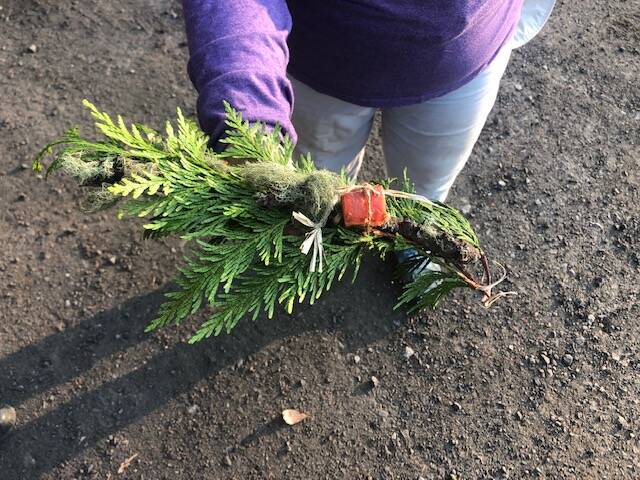by Toby Cooper
Sounder contributor
They came from every direction — from Orcas hamlets and mainland ports as far as Tacoma. They came by lumbering ferry and graceful Samish canoe. They came with joy, savoring the morning sunshine, blending their voices in enchanting traditional resonance and basking in the rich Native American culture that is so alive in San Juan County. They came to bless the quiet inland waters between Orcas and Shaw, now and forever to be known as “Cayou Channel” on Oct. 2.
“We live on (former) Harney Channel and I didn’t think much of the name until I happened to read The Oregon Trail by Rinker Buck,” said retired biologist Ken Carrasco who spearheaded the three-year effort to rename the two-mile strait.
Rinker’s book includes a graphic account of Brigadier General William Harney’s attack on a village of Brule Sioux in 1855.
Carrasco was hooked. He scrounged everywhere for sources, finding “The Pig War: Standoff at Griffin Bay” by Mike Vouri and a published PhD thesis, “General William S. Harney: Prince of Dragoons” by George Rollie Adams.
“The more I read, the more the measure of the man emerged,” he said. “There were a number of incidents recorded by credible sources which could be considered crimes against humanity.”
Despite his history of atrocities, Harney’s name comes up frequently on maps of the US. In Oregon, there is a peak, a county, and a lake. There is a street in Omaha, a sports complex in Kansas, a river in Everglades National Park, and more.
“Why do we honor this man?” Carrasco wondered.
Ultimately, he looked out his back window across the channel towards Shaw and said, “This has got to change.”
Teamed with friend Stephanie Buffam, they leveraged that “Aha” moment into a public campaign and made something wonderful happen on Orcas Island.
Renaming the channel to honor Henry Thomas Cayou was an easy decision. The man was a beacon of leadership, entrepreneurial energy, and public service throughout his life. Born in 1869 to a Lummi/Saanich mother and French-American father, Cayou lived much of his island life as a commercial fisherman, fishing the way his ancestors did. He and his family owned a cannery, a steam-powered tugboat, and a 500-acre farm on Decatur.
Cayou joined a school board, became a postmaster, and more, always looking to help his community. By 1897, he was serving as county road supervisor on Orcas.
“He plotted out Road #1, now called Deer Harbor Road,” said Councilmember Cindy Wolf, noting further that Cayou was elected to the council himself in 1906, before Native Americans had the right to vote. He served for 29 years.
And neither last nor least, Cayou co-founded San Juan County’s first electrical cooperative, Orcas Power Company – now called OPALCO.
Cayou died in 1959, leaving behind dozens of adoring relatives. Direct Cayou descendent and former Orcas postmaster Donna McNeil said it best.
“I was born and raised on these waters, fishing with my grampa. We always called this our home waters,” she said.
McNeil and Rosie Cayou – Henry’s great niece and McNeil’s great aunt – led a Sunday ceremony to bless the waters.
Perhaps the best is yet to come. Henry’s multicultural parentage seems to have set in motion a powerful sense of family that persists to this day. Represented at the celebration were the Samish, the Swinomish, the Upper Skagit and Mitchell Bay tribes. Canoe captain Sam Barr brought the Samish canoe from Lopez. But they gathered as family. The day belonged to family.



